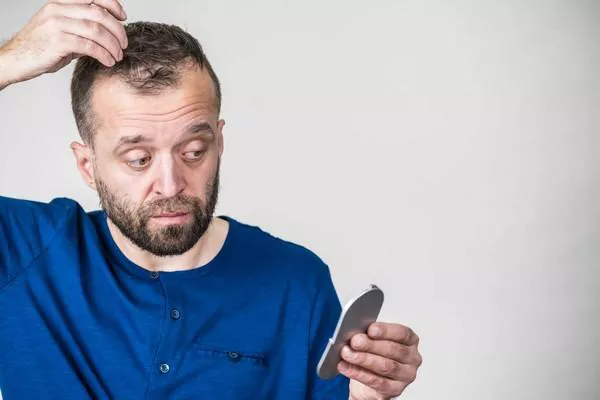Dealing with oily hair can be a common concern for many men. Excessive oil production can lead to a greasy and unkempt appearance, affecting confidence and overall grooming. However, with the right strategies and a consistent hair care routine, managing oily hair becomes a manageable task. In this article, we’ll explore practical tips for men to tackle grease and shine, ensuring that your hair looks and feels its best.
I. Understanding the Causes of Oily Hair
1. Overactive Sebaceous Glands
The primary cause of oily hair is the overactivity of sebaceous glands on the scalp. These glands produce sebum, a natural oil that helps keep the hair and scalp moisturized. However, an excess of sebum can lead to oily hair.
2. Hormonal Changes
Hormonal changes, particularly during adolescence, can contribute to increased oil production. Hormones like testosterone stimulate sebaceous glands, leading to an overproduction of sebum.
3. Environmental Factors
Environmental factors, such as humidity and pollution, can also impact oil production. Humid conditions can make the scalp produce more oil, exacerbating the issue of oily hair.
II. Practical Tips for Managing Oily Hair
1. Use a Gentle Shampoo
Choosing the right shampoo is crucial for managing oily hair. Opt for a gentle, sulfate-free shampoo designed for daily use. Frequent washing helps remove excess oil, but harsh shampoos can strip the scalp, leading to increased oil production.
2. Wash Hair Regularly
Frequent washing is essential for controlling oil buildup. Aim to wash your hair every day or every other day to keep oil at bay. Use lukewarm water, as hot water can stimulate oil production.
3. Avoid Overwashing
While washing is crucial, overwashing can strip the scalp, leading to a rebound effect where the sebaceous glands produce more oil to compensate. Strike a balance and wash your hair regularly without overdoing it.
4. Use a Clarifying Shampoo Occasionally
Incorporate a clarifying shampoo into your routine once a week to remove any product buildup and excess oil. Clarifying shampoos help maintain a healthy scalp by preventing clogged pores.
5. Choose the Right Conditioner
If you use conditioner, choose a lightweight, oil-free formula. Apply conditioner primarily to the ends of your hair, avoiding the scalp. Conditioner on the scalp can contribute to excess oil.
6. Embrace Dry Shampoo
Dry shampoo is a handy tool for absorbing excess oil between washes. It comes in powder or spray form and can be applied to the roots to refresh your hair and reduce greasiness.
7. Adjust Your Diet
Diet plays a role in overall skin health, including the scalp. A diet rich in omega-3 fatty acids, vitamins, and antioxidants can contribute to healthier skin and hair. Stay hydrated by drinking enough water to help balance oil production.
8. Avoid Touching Your Hair Too Often
Constantly touching your hair can transfer oil from your hands to your hair, making it appear greasier. Resist the urge to run your fingers through your hair throughout the day.
FAQs on Managing Oily Hair
1. Can I skip conditioner to reduce oiliness?
While conditioner can contribute to oiliness, it’s essential for maintaining the health of the hair. Opt for a lightweight, oil-free conditioner and focus on applying it to the ends of your hair to avoid the scalp.
2. Will using hot water make my oily hair worse?
Hot water can stimulate oil production, making oily hair worse. Use lukewarm water when washing your hair to help control oil without exacerbating the problem.
3. Can I use regular shampoo for oily hair?
Using a regular shampoo is acceptable as long as it is gentle and sulfate-free. Harsh shampoos can strip the scalp, leading to increased oil production. Look for shampoos specifically designed for daily use and oily hair.
4. Is it necessary to see a dermatologist for oily hair?
If home remedies and adjustments to your hair care routine don’t improve oily hair, consider consulting a dermatologist. They can assess your scalp health, rule out any underlying issues, and provide personalized recommendations.
5. Can certain hairstyles help manage oily hair?
Choosing the right hairstyle can help manage the appearance of oily hair. Shorter hairstyles may be more practical, as longer hair can trap oil against the scalp. Experiment with different styles to find what works best for you.
6. Are there specific products to avoid for oily hair?
Avoid heavy styling products like thick gels or pomades, as they can contribute to oiliness. Opt for lightweight styling products, and use them sparingly to prevent buildup.
7. Can stress contribute to oily hair?
Stress can influence various aspects of health, including oil production. While it may not be the sole cause, managing stress through relaxation techniques or exercise can contribute to overall well-being, potentially impacting the health of your scalp.
8. Can oily hair be a sign of a more serious health issue?
In most cases, oily hair is a common condition related to factors like genetics, hormones, or environmental factors. However, if oily hair is accompanied by other concerning symptoms, it’s advisable to consult with a healthcare professional to rule out any underlying health issues.
9. Can changing my pillowcase help with oily hair?
Changing your pillowcase regularly can contribute to overall scalp health. Pillowcases can accumulate oil, dirt, and product residue, which may transfer to your hair. Using a clean pillowcase can reduce the risk of these substances contributing to oiliness.
10. Can I use natural remedies to manage oily hair?
Natural remedies like tea tree oil or aloe vera can be beneficial for managing oily hair. These ingredients have properties that can help balance oil production and maintain a healthy scalp. However, it’s essential to patch-test any new remedies to ensure they don’t cause irritation.
In conclusion, managing oily hair in men involves a combination of the right hair care routine, product selection, and lifestyle adjustments. Understanding the causes of oily hair and incorporating practical tips into your daily routine can help tackle grease and shine, leaving you with healthier and more balanced-looking hair.

